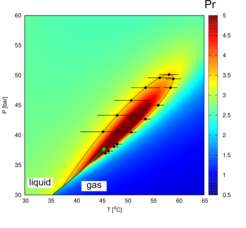Convection - Experiments
Turbulent non-Oberbeck Boussinesq convection
For simplicity, most theoretical and numerical studies on convection assume Oberbeck-Boussinesq (OB) conditions, which can be briefly summarized as - Density ρ, Isobaric heat capacity cp, thermal diffusivity κ, viscosity ν and isobaric expansion coefficient α are independent of temperature T and pressure p, while only for the buoyancy one assumes a that the density depend linearly on the temperature with coefficient α. In many natural and industrial convection systems, however, temperature differences are very large and thus the OB-assumption is violated.
We study Rayleigh-Bénard Convection systems beyond OB approximation using Sulphur Hexafluoride (SF6) near its critical point, where material parameters vary significantly with temperature and pressure. We focus on the two unique characteristics of such system: the deviation of the centre temperature Tc
from mean temperature Tm due to the broken symmetry, and its relation to the change in global heat transport efficiency Nu/NuOB. There are two goals of the study: 1. to generalized current theories and understandings on the OB system to real-world fluids 2. to eliminate NOB effects in the search of ultimate states.

